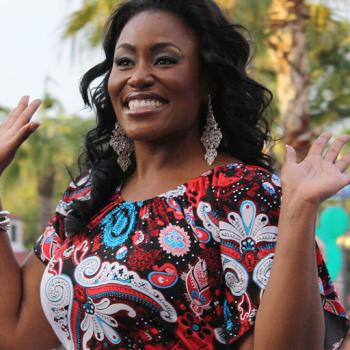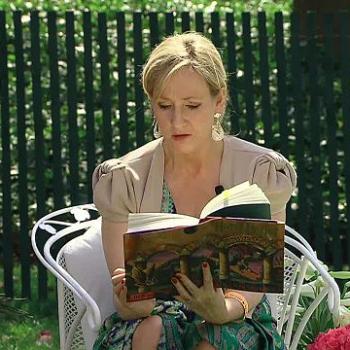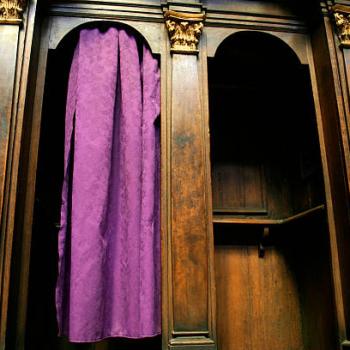“Once the father of your children is out of the picture, the only solution is total and lifelong celibacy. And if you violate that, heaven forgive you. Good luck!” — Mrs. Doubtfire
***
After watching this film for the first time in my little Robin Williams marathon of a couple months ago, I knew it was an important one to address if I ever did a series like this. So today, we’ll continue our series on Marriage in the Movies with Mrs. Doubtfire.
The movie tells the story of an eccentric actor named Daniel Hillard, who goes to extreme lengths to stay in touch with his children when his wife files for divorce. “Extreme,” in this case, means applying for and getting a job as their nanny…in disguise. His new persona is a gentle, twinkle-eyed Scottish grandma, whom he hastily christens “Mrs. Doubtfire.”
Turns out, “Mrs. Doubtfire” is Mrs. Hillard’s dream nanny—firm, kind, wonderful with the children, and constantly doling out little nuggets of life wisdom on a variety of topics, including marriage. But when another man enters the picture, things get very awkward very fast, and the question becomes not “whether” Daniel will lose his cover, but “when.”
The film, which became one of Williams’s most popular roles, is billed as a comedy. But it winds up feeling more like a tragedy, as the shattering effects of divorce are very convincingly presented. However, I wouldn’t mind so much if it stopped there. It may be depressing, but at least it’s truthful. What’s really pernicious about the thing is that by the end, it’s trying to sell audiences on the lie that maybe divorce isn’t so bad after all. That’s where it goes Importantly Wrong.
When Mrs. Hillard first demands a divorce and takes custody of the children, it initially seems like we’re supposed to view her case as frivolous at best. Her husband hasn’t cheated on her, he’s not in the throes of substance abuse, he adores their children, and he’s not abusing his family physically or verbally. Sure, he’s an eccentric man-child who sometimes acts strange or unreasonable, plus he has an annoying habit of lapsing into voice impressions at the drop of a hat. But all this doesn’t seem to add up to much more than…

And not even the real Robin Williams, who would have given her more excuse, but silly, harmless, corny-family-movie-friendly Robin Williams. And because Williams really is a gifted actor, he makes the viewer feel Daniel’s anguish very keenly. The moment when it finally sinks in for him that she seriously wants a divorce is absolutely heartbreaking. “We have nothing in common,” she says. “Sure we do. We love each other.” Long pause. “We love each other… don’t we?”
We also see the how the divorce affects the children, aged roughly 5 to 14. They’re confused and hurt by their mother’s choices. They witness painful, caustic arguments. The little one wonders why Daddy can’t read bedtime stories to her in funny voices anymore. The teenage daughter wonders why Mom and Dad can’t just “pretend to be happy” (this line actually comes from a revealing deleted scene, on which more anon).
One cause of the tension is that Mrs. Hillard is bringing home the bacon, while Mr. Hillard’s eccentric notions keep him from even holding down a job as a voiceover actor. This is expanded on in another deleted scene where he says bitterly, “I’m sorry I don’t bring in as much as you” and criticizes his wife for coming home too late have a real relationship with their kids. She retaliates, “Excuse me if I happen to be the only steady bread-winner in this family since we got married. Excuse me if I happen to work hard. Excuse me if every once in a while I get home late to this pig-stye you call a home.” Though this scene was cut, I think it speaks volumes about the latent problems in a reversed-roles marriage. I’m not saying every marriage that operates this way is bound to end in bitter divorce, but I don’t believe it’s a natural template. In the film, both husband and wife secretly struggle with feelings of guilt and inadequacy, because they’re not fulfilling the roles they’re naturally called to. He can’t provide, and she can’t be with the children or keep the house in order. Of course, I’m sure the liberal film-makers weren’t intending to make this particular point, but it’s a giant elephant in the room.
Once “Mrs. Doubtfire” enters the picture, Daniel uses the opportunity to try to gain insight on his wife’s choices. She confides her feelings to Mrs. Doubtfire in a way she never did with him. In return, he offers some of the Scottish granny’s homespun wisdom in a poignant, indirect attempt to shift her thinking. While many of these pearls are simply humorous (“My poor husband Winston, it was the drink that killed him… he was hit by a Guinness truck”) some of it is actually quite insightful. In describing Mrs. Doubtfire’s made-up husband “Winston,” Daniel creates a marriage in his mind that may not have been glamorous or thrilling, but it lasted because it was built on love. “Dear, I always say, a flawed husband is better than none at all.” She replies with the devastating line, “Who needs a husband when I’ve got you?” She further shares that she feels like she’s “a better person” when she’s not around her husband. The more he disrupted everything with his goofball ways, the harsher and more controlling she became with both him and the children. Now that they’re separated, she doesn’t feel so tense and guilty anymore.
This is very believable and human, but it’s also where the movie begins to go downhill. We’re still supposed to feel for Daniel, but we’re also supposed to become persuaded by her side of the story. While separation may not always be a bad idea, the film seems incapable of making a clear distinction between that temporary choice and the permanent dissolution of the marriage. Instead, we get this completely fatalistic attitude from the wife, where she simply assumes that it could only get worse, never better.
Things escalate further when she brings home a maddeningly handsome Pierce Brosnan to meet the kiddos. “Isn’t he fabulous?” bubbles Mrs. Hillard. Mrs. Doubtfire replies witheringly, “If you like that handsome, rugged type. But personally I prefer short, furry and funny.” The incensed nanny strongly warns her away from the interloper, implying that his intentions are dishonorable. This leads to the quote at the head of my post, when Mrs. Hillard delicately asks whether Mrs. Doubtfire ever had romantic thoughts after “Winston” died. Mrs. Doubtfire replies with a staunch “Never” and solemnly declares that “total and lifelong celibacy” is the only moral option for Mrs. Hillard. “Celibacy?” his wife asks in horror. “Yes dear. And if you violate that, heaven forgive you. Good luck!” Quote of the movie, in my personal opinion.
But again, it becomes troublingly clear that the film-makers intend this to be a caricatured, outdated view of marriage. Mrs. Doubtfire lives in the past, but Daniel Hillard lives in the present. In the cut scene I mentioned before, he arrives late to his daughter Lydia’s spelling bee and unreasonably demands that the lady who took his seat be made to move. As Lydia watches the sparks fly from the stage, she falters and loses the contest. Afterwards, he asks his wife to let them speak alone and begs Lydia’s forgiveness. She asks him why he and his wife couldn’t just “pretend to be happy.” His reply, “We probably could… But we’d be a pretend family… It wouldn’t be real. You know, we’d be acting.” This somehow equates acting like an adult in public with “pretending to be happy,” as well as presenting a pernicious false dilemma: Either put up a fake front without addressing the underlying issues in the marriage, or call it quits.
In the end, all of Mrs. Doubtfire’s efforts are in vain, and the couple separates for good at the end of the film, though his wife magnanimously decides to grant shared custody. (See also Kramer vs. Kramer. Seriously, are we supposed to give these women a medal or something?) Meanwhile, Daniel lands his own TV show with his new persona, and the end of the movie shows Mrs. Doubtfire’s supposed “growth” in knowledge as “she” replies to a letter from a little fan who’s also experiencing divorce. This piece de resistance of nonsense is worth quoting in full, because it’s the philosophy undergirding much of our culture—and cultural decay:
You know, some parents, when they’re angry, they get along much better when they don’t live together. They don’t fight all the time, and they can become better people, and much better mummies and daddies for you. And sometimes they get back together. And sometimes they don’t, dear. And if they don’t, don’t blame yourself. Just because they don’t love each other anymore, doesn’t mean that they don’t love you.
There are all sorts of different families, Katie. Some families have one mommy, some families have one daddy, or two families. And some children live with their uncle or aunt. Some live with their grandparents, and some children live with foster parents. And some live in separate homes, in separate neighborhoods, in different areas of the country – and they may not see each other for days, or weeks, months… even years at a time. But if there’s love, dear… those are the ties that bind, and you’ll have a family in your heart, forever.
Oh bless your heart dear, how to put this delicately… bovine excretum.
You know, this brings to mind something wise Keith Green once said in a speaking presentation, years before this movie was made. He was speaking about bad marriages—the constant friction, the annoyances, the rubbing up against each other in all the wrong ways. But he said that it’s better to have a bad marriage. Better than the alternative. “Because,” he said, “At least you have a commitment. You have something to work with.” That’s the vital piece that this movie lacks: commitment. All it’s interested in is the question of whether Mr. and Mrs. Hillard feel love toward each other. But this is not the overarching question. The overarching question, indeed, the only question, is “Did you or did you not swear an oath to have and to hold each other, for better or worse, richer or poorer, in sickness and in health, ’til death do you part?”
This seems fundamental enough that even a non-Christian could grasp it by the natural light. But if Mrs. Doubtfire is any indication, perhaps that’s too much to ask.













